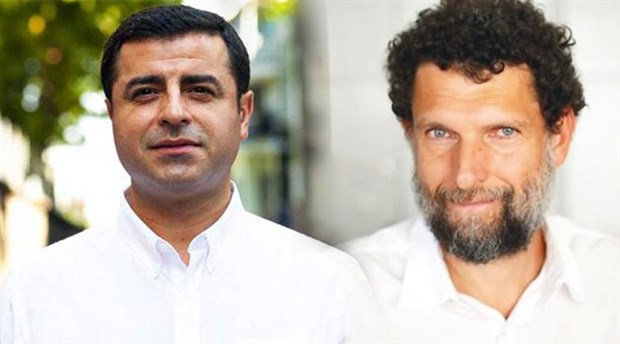Prominent rights group the Amnesty International’s (AI) Europe Director Nils Muižnieks has said Turkey’s failure to release Turkish philanthropist Osman Kavala and Kurdish politician Selahattin Demirtaş from jail in line with rulings from the European Court of Human Rights (ECtHR) “makes a mockery” of a human rights action plan unveiled by Turkish President Recep Tayyip Erdoğan last week.
Responding to calls by the Council of Europe’s Committee of Ministers on the Turkish government to implement binding ECtHR judgments and release Kavala and Demirtaş, Muižnieks said, “Osman Kavala and Selahattin Demirtaş have been arbitrarily and unjustly deprived of their liberty for years, despite the binding court decisions that they be released.”
“Their continued detention makes a mockery of President Erdoğan’s government’s attempts to whitewash systemic human rights abuses by unveiling a meaningless Human Rights Action Plan last week,” said Muižnieks.
At a time when Turkey is the subject of harsh criticism due to gross human rights violations, Erdoğan on March 2 announced a human rights action plan that led to widespread skepticism due to the government’s poor record on human rights. The president said the action plan would strengthen rights to a free trial and freedom of expression.
“This action plan and Turkey’s generic platitudes cannot hide the reality: the ongoing imprisonment of these two men, and scores of others, for simply exercising their rights shows that in Turkey, freedom of expression is ruthlessly punished,” said Muižnieks.
He said the Turkish authorities must release Kavala and Demirtaş, allow human rights defenders to do their work and stop putting undue pressure on their judges.
“It is high time that states across Europe tell Turkey that prosecuting and imprisoning people for political reasons is unacceptable. The Committee of Ministers’ decision to keep Turkey under its watch on a weekly basis is a welcome step ahead of an infringement procedure,” he added.
In the aftermath of a failed coup attempt in Turkey on July 15, 2016, Erdoğan launched a massive crackdown on non-loyalist citizens under the pretext of an anti-coup fight, which led to the prosecution of tens of thousands of people on trumped-up terrorism or coup charges.
Kavala, a well-known figure in Turkish civil society, has been jailed since October 2017. He faces a potential sentence of life in prison for allegedly trying to overthrow the government of President Recep Tayyip Erdoğan in a July 2016 coup attempt and also is charged with espionage.
Those charges were recently combined with a case surrounding his role in 2013 anti-government protests.
He was originally acquitted in the protest case, but the decision was overturned on appeal in January.
The ECtHR on December 10, 2019 found a violation upon reviewing Kavala’s application, calling for his immediate release. The judgment ruled that the evidence on which Kavala was detained for the Gezi protests and a 2016 coup attempt was insufficient and agreed that Kavala’s detention and the charges against him “pursued an ulterior purpose, namely, to silence him as a human rights defender.” Turkey, however, refused to abide by the ruling.
Demirtaş co-led the second-largest opposition party, the Peoples’ Democratic Party (HDP), a left-wing party with majority Kurdish support, before his arrest on politically motivated charges in November 2016. He ran for president twice against Erdoğan — once while incarcerated — and is a vocal critic of the government.
Demirtaş has been in prison since then, in spite of two binding rulings in favor of his release by the ECtHR. The Turkish government still refuses to release Demirtaş, and a Turkish court on January 7 accepted a new indictment against him and 107 others calling for life sentences in relation to the Kobani protests of 2014.


